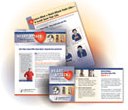What Causes a Heart Attack?
Coronary Heart Disease
A heart attack happens if the flow of oxygen-rich blood to a section of heart muscle suddenly becomes blocked. Most heart attacks occur as a result of coronary heart disease (CHD).
CHD is a condition in which a waxy substance called plaque builds up inside of the coronary arteries. These arteries supply oxygen-rich blood to your heart.
When plaque builds up in the arteries, the condition is called atherosclerosis. The buildup of plaque occurs over many years.
Eventually, an area of plaque can rupture (break open) inside of an artery. This causes a blood clot to form on the plaque's surface. If the clot becomes large enough, it can mostly or completely block blood flow through a coronary artery.
If the blockage isn't treated quickly, the portion of heart muscle fed by the artery begins to die. Healthy heart tissue is replaced with scar tissue. This heart damage may not be obvious, or it may cause severe or long-lasting problems.
Coronary Artery Spasm
A less common cause of heart attack is a severe spasm (tightening) of a coronary artery. The spasm cuts off blood flow through the artery. Spasms can occur in coronary arteries that aren't affected by atherosclerosis.
What causes a coronary artery to spasm isn't always clear. A spasm may be related to:
- Taking certain drugs, such as cocaine
- Emotional stress or pain
- Exposure to extreme cold
- Cigarette smoking
The animation below shows how plaque buildup or a coronary artery spasm can lead to a heart attack. Click the "start" button to play the animation. Written and spoken explanations are provided with each frame. Use the buttons in the lower right corner to pause, restart, or replay the animation, or use the scroll bar below the buttons to move through the frames.
The animation shows how blocked blood flow in a coronary artery can lead to a heart attack.
Featured Video
The NHLBI "Grand Opportunity" Exome Sequencing Project
-
 Heart Attack Warning Symptoms
Heart Attack Warning Symptoms
10/20/2011
Have questions about heart disease in women? Join The Heart Truth®, Million Hearts™, the American College of Cardiology, and Healthfinder.gov for a World Heart Day Twitter chat on September 28, at 1 p.m. eastern time. Learn more about the history of women’s heart disease research and ask live experts your questions. Go to www.twitter.com, and search for #HeartChat to join the chat.
Clinical trials are research studies that explore whether a medical strategy, treatment, or device is safe and effective for humans. To find clinical trials that are currently underway for Heart Attack, visit www.clinicaltrials.gov.
September 4, 2012
Silent heart attacks are common and predict risk of death, MRI diagnosis shows
Magnetic resonance imaging (MRI) is more effective than electrocardiography (ECG) at identifying "silent" heart attacks, also known as unrecognized myocardial infarctions, according to a study performed by National Institutes of Health researchers and international colleagues.

When a heart attack happens, any delays in treatment can be deadly.
Knowing the warning symptoms of a heart attack and how to take action can save your life or someone else’s.
The NHLBI has created a new series of informative, easy-to-read heart attack materials to help the public better understand the facts about heart attacks and how to act fast to save a life.
Click the links to download or order the NHLBI's new heart attack materials:
“Don’t Take a Chance With a Heart Attack: Know the Facts and Act Fast” (also available in Spanish)
“Heart Attack: Know the Symptoms. Take Action.”
“Learn What a Heart Attack Feels Like—It Could Save Your Life”
The NHLBI updates Health Topics articles on a biennial cycle based on a thorough review of research findings and new literature. The articles also are updated as needed if important new research is published. The date on each Health Topics article reflects when the content was originally posted or last revised.

















 The NHLBI "Grand Opportunity" Exome Sequencing Project
The NHLBI "Grand Opportunity" Exome Sequencing Project